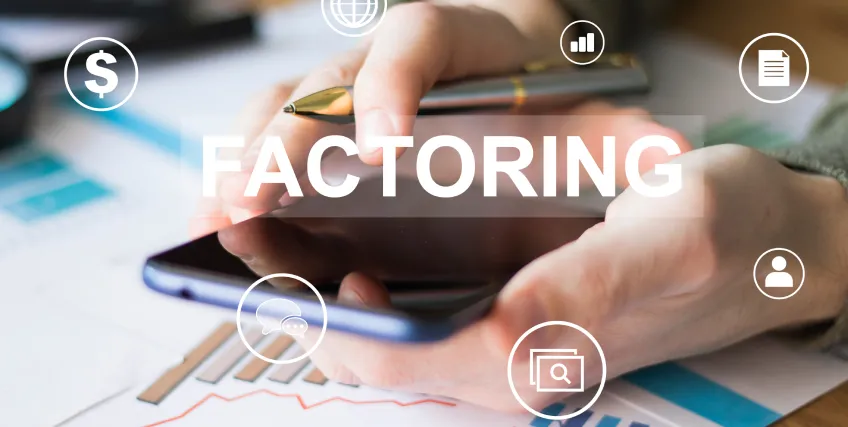Unlock Your Unpaid
Invoices. Get Cash When
You Need It.
Looking for Business Financing?
Apply now for flexible business financing. Biz2Credit offers term loans, revenue-based financing, lines of credit, and commercial real estate loans to qualified businesses.
Set up a Biz2Credit account and apply for business financing.
Cash flow gaps are a common issue for small businesses. Late customer payments can delay operations, payroll, and new opportunities. That’s where invoice financing helps.
It’s a short-term funding option that lets you borrow money against unpaid customer invoices. You don’t wait weeks for clients to pay; you get most of the invoice value upfront. This helps keep your business moving, even when customer payments are slow.
With invoice financing, your outstanding invoices become working capital. It’s fast, flexible, and helps maintain steady cash flow without taking on new debt. Whether you're a startup or a growing company, it offers a simple way to cover daily expenses while waiting on due dates.
What is Invoice Financing?
Invoice financing is a type of financing that helps small businesses get quick access to cash tied up in outstanding invoices. Instead of waiting for customer payments, businesses can unlock most of the invoice amount upfront.
With invoice financing, the business uses its accounts receivable as collateral. A lender advances a percentage of the invoice value, usually between 70% and 90%. When the customer pays, the remaining balance (minus fees) goes to the business.
It’s different from invoice factoring, where the invoice factoring company collects payments directly from your customers. In factoring invoice financing, you still manage the payment terms and customer relationships.
This financing solution is useful for businesses that deal with long payment cycles, especially B2B industries. It offers flexibility without the heavy paperwork of bank loans. It also doesn’t require perfect credit scores, making it easier to qualify than a traditional small business loan.
Whether you’re facing cash flow issues, handling large orders, or bridging seasonal lulls, invoice financing for small business provides a simple, fast way to access the cash you’ve already earned.
How is Invoice Financing Structured?
The structure of invoice financing is simple. A business submits unpaid invoices to a lender, who then advances a portion of the invoice amount. This advance usually ranges from 70% to 90%, depending on the invoice value, creditworthiness of the client, and the industry.
The remaining portion, called the reserve, is held until the customer payment is received. Once the invoice is paid in full, the lender releases the remaining balance, minus a service fee or factoring fee.
There are two main types: invoice factoring and invoice discounting. In invoice factoring, the lender often takes control of collections. In discounting, the business retains that responsibility.
This structure allows small business owners to access a cash advance without waiting 30, 60, or 90 days. It's a flexible financing option for managing cash flow problems and staying on top of expenses during slow customer invoice cycles.
What are the Criteria for Invoice Financing?
To qualify for invoice financing, your business must meet certain requirements. These help the lender assess the risk and ensure your customer payments are likely to come in on time. Here are the key criteria:
You Must Serve Business-to-Business (B2B) Customers
Invoice financing is designed for B2B businesses that issue invoices with net terms like 30, 60, or 90 days. If your customers are other businesses and not individuals, you’re more likely to qualify. This model works best when the invoice value is clear, and the due date is defined. Retail or cash-based businesses may not be eligible because they don’t have accounts receivable from other companies. Most invoice financing companies prefer working with businesses that deal with corporate clients with good creditworthiness.
Your Invoices Must Be Unpaid and Valid
Only outstanding invoices that are not yet overdue qualify for invoice financing. These invoices must be accurate, verifiable, and have clear payment terms. The lender checks if your customer has received the goods or services. Any dispute or missing detail could cause delays or rejection. The type of invoice, invoice amount, and the customer’s payment history also play a role in approval.
Your Customers Must Have Good Credit
While your own credit score matters, the lender focuses more on your customer’s creditworthiness. The idea is simple—if your clients pay on time, you’re a lower risk. This makes invoice financing for small business a good option for firms with clients who are financially stable. Delinquent or slow-paying customers can increase the factoring fee or lead to rejection altogether. That’s why credit checks on clients are standard in the approval process.
Minimum Monthly Revenue Requirements
Many lenders have a minimum revenue threshold. This shows your business has steady cash flow and enough customer invoices to qualify for funding. Requirements vary, but most providers look for at least $10,000 to $50,000 in monthly revenue. Consistent earnings assure the invoice financing company that your business can cover any additional fees or service charges that come with the funding.
Business History and Legal Standing
Most providers prefer businesses with at least 6–12 months of operating history. Startups may qualify if they have strong partnerships and reliable customers. You’ll also need a U.S.-based business bank account and up-to-date legal documents. Your company should be in good standing with state and federal agencies. These checks confirm you’re running a legitimate operation eligible for invoice loan for small business support.
Clear and Transparent Invoicing Practices
The cleaner your invoicing system, the easier the process. Lenders look at how you issue, track, and manage invoice payments. Well-documented payment terms, due dates, and customer contact info reduce risk for the financing company. Using invoicing software or a structured system can improve your chances and speed up funding. It also reflects good business financing practices, especially for those applying for instant invoice finance or similar fast-track options.
What Does Invoice Financing Cost?
The cost of invoice financing depends on several factors like the invoice amount, customer’s credit profile, and how long it takes them to pay. Here are the common charges to expect:
Factoring Fee or Discount Rate
This is the main cost in invoice financing. It’s usually 1% to 5% of the invoice value, charged weekly or monthly. This fee is also called the factoring fee in invoice factoring models. It covers the risk and service of advancing funds before customer payment. If your customer delays payment, the fee keeps adding up. So, the longer it takes to collect, the more expensive the financing gets. For small business owners, especially those seeking invoice loan for small business, this is the biggest cost to watch.
Service Fees
Some of the best invoice financing companies charge a flat service fee in addition to the factoring fee. This covers account setup, administration, or wire transfer charges. While not always high, these additional fees can add up, especially with high invoice volumes. Always ask if the provider includes these in the total cost or charges them separately. If you need instant invoice finance, expect slightly higher service charges for faster disbursal.
Late Payment Penalties
If your customer invoices aren’t paid on time, the cost of invoice financing goes up. Some providers charge extra when invoice payments go beyond the agreed payment terms. These penalties are often a percentage of the unpaid amount, added every week until the balance is cleared. This can impact your cash flow if not managed well. Businesses looking for invoice financing for small business must factor in these charges when calculating total expenses.
Origination Fees
Though not universal, some invoice financing companies charge an origination fee when you first sign up. This one-time cost helps cover the application process, credit check, and onboarding. For businesses with limited financing experience, it’s important to understand these upfront costs. If you're comparing factoring invoice financing options, look at this fee along with interest rates and service charges.
Advance Rate Adjustments
In some cases, your advance rate may be adjusted based on risk. For example, a lender may offer only 70% instead of 90% if the invoice value is uncertain or if the customer’s creditworthiness is low. This indirectly increases the cost of invoice financing, as you're getting less upfront while paying similar fees. Businesses using invoice loans for small business models should check these rates before agreeing to terms.
What are the Pros and Cons of Invoice Financing?
Invoice financing can be a strong solution for small businesses dealing with cash flow problems. But like all tools, it has upsides and downsides. Here’s a clear breakdown:
Pros of Invoice Financing
Quick Access to Working Capital
One of the biggest benefits of invoice financing is speed. Instead of waiting 30, 60, or 90 days for invoice payments, you can access funds considerably faster than other financing options. This helps stabilize cash flow, especially when dealing with large orders or seasonal gaps. For startups and growing companies, invoice financing offers immediate relief without long approval processes like traditional bank loans.
No Need for Strong Credit Scores
Unlike most business loan options, invoice financing for small business relies more on your customer’s creditworthiness than yours. That makes it ideal for small business owners with low or average credit scores. The focus is on the invoice value and the customer’s ability to pay on time. This flexibility makes factoring invoice financing accessible even to new or less established businesses.
Keeps Equity and Ownership Intact
With invoice financing, you don’t give up any part of your business. You're simply borrowing against accounts receivable. It’s a short-term financing solution, not a long-term investment deal. This makes it appealing for founders who want to stay in control while still solving urgent cash flow issues. Many best invoice financing companies highlight this non-dilutive advantage.
Cons of Invoicing Financing
Costs Can Add Up Fast
The biggest drawback of invoice financing is the total cost. Between factoring fees, service fees, and late payment penalties, expenses can pile up quickly. Businesses depending heavily on this model may pay more than with a line of credit or a traditional business loan. For companies using invoice loans for small business often, these costs can erode profits if not managed properly.
Risk to Customer Relationships
In invoice factoring, the lender may contact your customers directly to collect payments. This can feel intrusive and affect your partnerships. If your customer sees it as a lack of financial control, it may hurt trust. For this reason, some small businesses prefer invoice discounting, where they manage collections internally. Choosing the right structure is key to protecting your brand.
Not Ideal for All Business Types
Invoice financing works best for B2B businesses that issue large, regular invoices. It’s less useful for retail, hospitality, or companies with direct-to-consumer models. If you don’t have reliable customer invoices or predictable payment terms, approval will be hard. Also, some invoice financing companies won’t work with industries considered high risk. That limits access to certain sectors.
Alternatives to Invoice Financing
If invoice financing isn’t fit for your business, there are other ways to boost cash flow. Each option has its own pros and risks. Here are a few common alternatives:
Business Line of Credit
A line of credit gives you flexible access to funds when needed. You can borrow up to a set limit and pay interest only on what you use. It's a strong financing solution for managing cash flow issues without relying on customer invoices. Approval depends on your credit score, revenue, and time in business. For businesses that don’t qualify for invoice financing for small business, a line of credit offers more control and lower ongoing costs than invoice factoring.
Short-Term Loans
Short-term business loans provide a lump sum of cash with a fixed repayment schedule. They’re ideal for urgent needs like buying inventory, covering payroll, or dealing with seasonal dips. Compared to factoring invoice financing, they don’t rely on unpaid invoices. But repayment terms are strict, and interest rates may be higher. This option is best for businesses with steady revenue and a solid bank account history.
Merchant Cash Advances (MCA)
An MCA gives you an advance based on future credit card or sales revenue. Repayments happen daily as a percentage of earnings. It’s a fast but expensive alternative to instant invoice finance. Use this only if other options are off the table. It doesn’t require customer invoices but often comes with high service fees and daily deductions, which can strain cash flow.
Trusted by Thousands of Small Business Owners in America.**
Simply because we get what you go through to build a business you believe in.
**Disclaimer: All stories are real, as told by real business owners. Customers do not receive monetary compensation for telling their stories.
From One Entrepreneur to Another: We Get You
We understand what's behind building a business you believe in.
All stories are real, as told by real business owners. Customers do not receive monetary compensation for telling their stories.



Articles on Invoice Financing
What is Factoring? Definition and Benefits of Factoring for Small Businesses
In the complex world of business finance, “factoring” has emerged as a valuable tool for small business owners seeking flexible solutions to their cash flow challenges.
What Is Invoice Financing and How Does It Work?
Small businesses often deal with irregular cash flow, especially when they get paid by customers through invoices. In these business models,
Pros and Cons of Invoice Financing for Small Businesses
Cash flow issues can make or break a small business. Even profitable companies often run on small margins, sometimes struggling to meet payroll,
The Complete Guide to the Cost of Invoice Financing
Businesses are always looking for ways to expand their financial opportunities. One powerful tool is invoice financing. Invoice financing helps companies
Frequently Asked Questions on invoice Financing
1. What types of businesses use invoice financing?
Invoice financing is mostly used by B2B businesses like manufacturers, wholesalers, logistics firms, and service providers. These businesses often have long payment terms and outstanding invoices that delay cash flow
2. Is invoice financing the same as a loan?
Invoice financing is an advance on your accounts receivable. It’s not a traditional business loan, though you still pay fees and possibly interest rates.
3. What’s the difference between invoice factoring and invoice financing?
With invoice factoring, the lender purchases your invoices and collects payment from your customers. In invoice financing, you retain control of collections and repay the advance once your invoice payments come in. Both solve cash flow problems, but factoring is more hands-off.
4. Does invoice financing affect my credit score?
Since invoice financing is based on accounts receivable, most providers don’t report to credit bureaus. But if you default or misuse funds, it could affect your ability to secure future business financing.
5. Can I choose which invoices to finance?
Many invoice financing companies allow you to select specific customer invoices based on size or risk. This gives you more flexibility in managing cash flow and financing costs.




